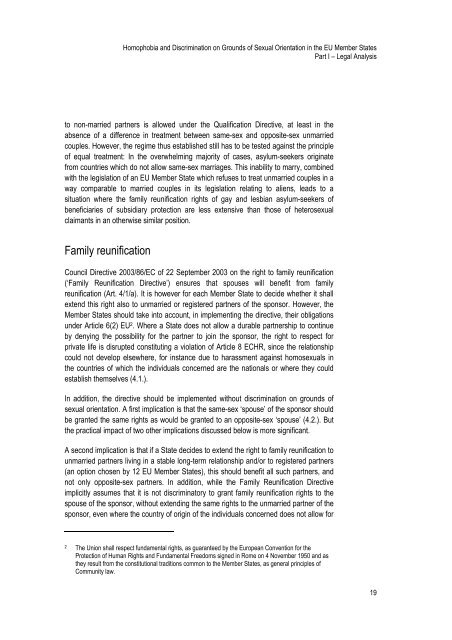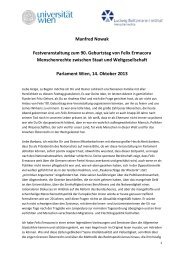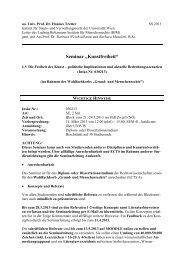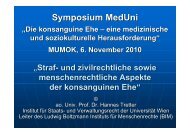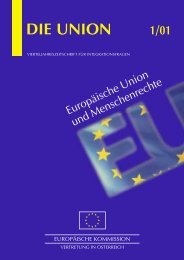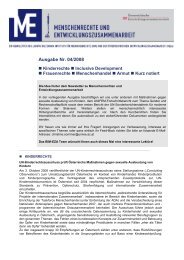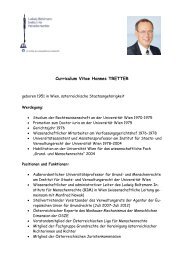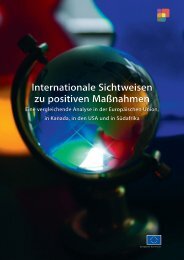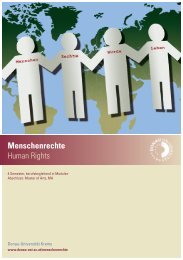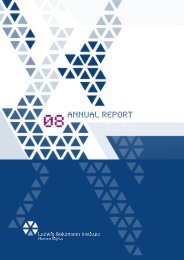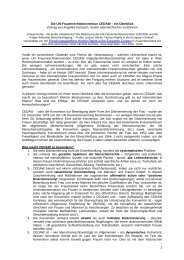Homophobia and Discrimination on Grounds of Sexual Orientation ...
Homophobia and Discrimination on Grounds of Sexual Orientation ...
Homophobia and Discrimination on Grounds of Sexual Orientation ...
You also want an ePaper? Increase the reach of your titles
YUMPU automatically turns print PDFs into web optimized ePapers that Google loves.
<str<strong>on</strong>g>Homophobia</str<strong>on</strong>g> <str<strong>on</strong>g>and</str<strong>on</strong>g> <str<strong>on</strong>g>Discriminati<strong>on</strong></str<strong>on</strong>g> <strong>on</strong> <strong>Grounds</strong> <strong>of</strong> <strong>Sexual</strong> Orientati<strong>on</strong> in the EU Member StatesPart I – Legal Analysisto n<strong>on</strong>-married partners is allowed under the Qualificati<strong>on</strong> Directive, at least in theabsence <strong>of</strong> a difference in treatment between same-sex <str<strong>on</strong>g>and</str<strong>on</strong>g> opposite-sex unmarriedcouples. However, the regime thus established still has to be tested against the principle<strong>of</strong> equal treatment: In the overwhelming majority <strong>of</strong> cases, asylum-seekers originatefrom countries which do not allow same-sex marriages. This inability to marry, combinedwith the legislati<strong>on</strong> <strong>of</strong> an EU Member State which refuses to treat unmarried couples in away comparable to married couples in its legislati<strong>on</strong> relating to aliens, leads to asituati<strong>on</strong> where the family reunificati<strong>on</strong> rights <strong>of</strong> gay <str<strong>on</strong>g>and</str<strong>on</strong>g> lesbian asylum-seekers <strong>of</strong>beneficiaries <strong>of</strong> subsidiary protecti<strong>on</strong> are less extensive than those <strong>of</strong> heterosexualclaimants in an otherwise similar positi<strong>on</strong>.Family reunificati<strong>on</strong>Council Directive 2003/86/EC <strong>of</strong> 22 September 2003 <strong>on</strong> the right to family reunificati<strong>on</strong>(‘Family Reunificati<strong>on</strong> Directive’) ensures that spouses will benefit from familyreunificati<strong>on</strong> (Art. 4/1/a). It is however for each Member State to decide whether it shallextend this right also to unmarried or registered partners <strong>of</strong> the sp<strong>on</strong>sor. However, theMember States should take into account, in implementing the directive, their obligati<strong>on</strong>sunder Article 6(2) EU 2 . Where a State does not allow a durable partnership to c<strong>on</strong>tinueby denying the possibility for the partner to join the sp<strong>on</strong>sor, the right to respect forprivate life is disrupted c<strong>on</strong>stituting a violati<strong>on</strong> <strong>of</strong> Article 8 ECHR, since the relati<strong>on</strong>shipcould not develop elsewhere, for instance due to harassment against homosexuals inthe countries <strong>of</strong> which the individuals c<strong>on</strong>cerned are the nati<strong>on</strong>als or where they couldestablish themselves (4.1.).In additi<strong>on</strong>, the directive should be implemented without discriminati<strong>on</strong> <strong>on</strong> grounds <strong>of</strong>sexual orientati<strong>on</strong>. A first implicati<strong>on</strong> is that the same-sex ‘spouse’ <strong>of</strong> the sp<strong>on</strong>sor shouldbe granted the same rights as would be granted to an opposite-sex ‘spouse’ (4.2.). Butthe practical impact <strong>of</strong> two other implicati<strong>on</strong>s discussed below is more significant.A sec<strong>on</strong>d implicati<strong>on</strong> is that if a State decides to extend the right to family reunificati<strong>on</strong> tounmarried partners living in a stable l<strong>on</strong>g-term relati<strong>on</strong>ship <str<strong>on</strong>g>and</str<strong>on</strong>g>/or to registered partners(an opti<strong>on</strong> chosen by 12 EU Member States), this should benefit all such partners, <str<strong>on</strong>g>and</str<strong>on</strong>g>not <strong>on</strong>ly opposite-sex partners. In additi<strong>on</strong>, while the Family Reunificati<strong>on</strong> Directiveimplicitly assumes that it is not discriminatory to grant family reunificati<strong>on</strong> rights to thespouse <strong>of</strong> the sp<strong>on</strong>sor, without extending the same rights to the unmarried partner <strong>of</strong> thesp<strong>on</strong>sor, even where the country <strong>of</strong> origin <strong>of</strong> the individuals c<strong>on</strong>cerned does not allow for2The Uni<strong>on</strong> shall respect fundamental rights, as guaranteed by the European C<strong>on</strong>venti<strong>on</strong> for theProtecti<strong>on</strong> <strong>of</strong> Human Rights <str<strong>on</strong>g>and</str<strong>on</strong>g> Fundamental Freedoms signed in Rome <strong>on</strong> 4 November 1950 <str<strong>on</strong>g>and</str<strong>on</strong>g> asthey result from the c<strong>on</strong>stituti<strong>on</strong>al traditi<strong>on</strong>s comm<strong>on</strong> to the Member States, as general principles <strong>of</strong>Community law.19


